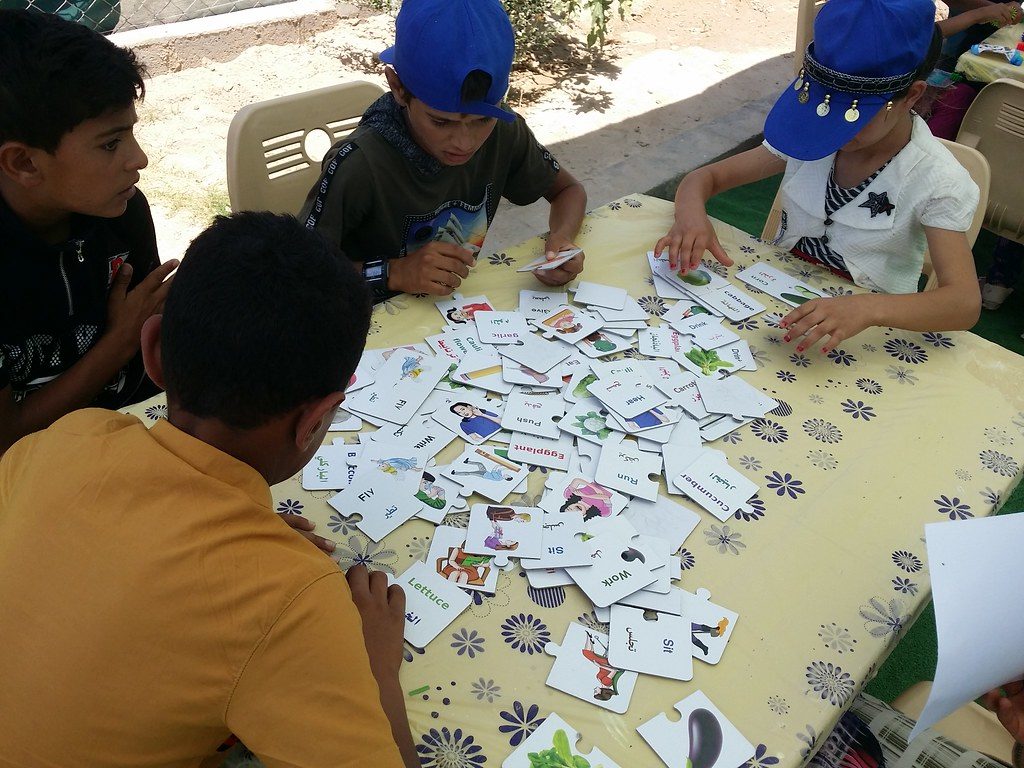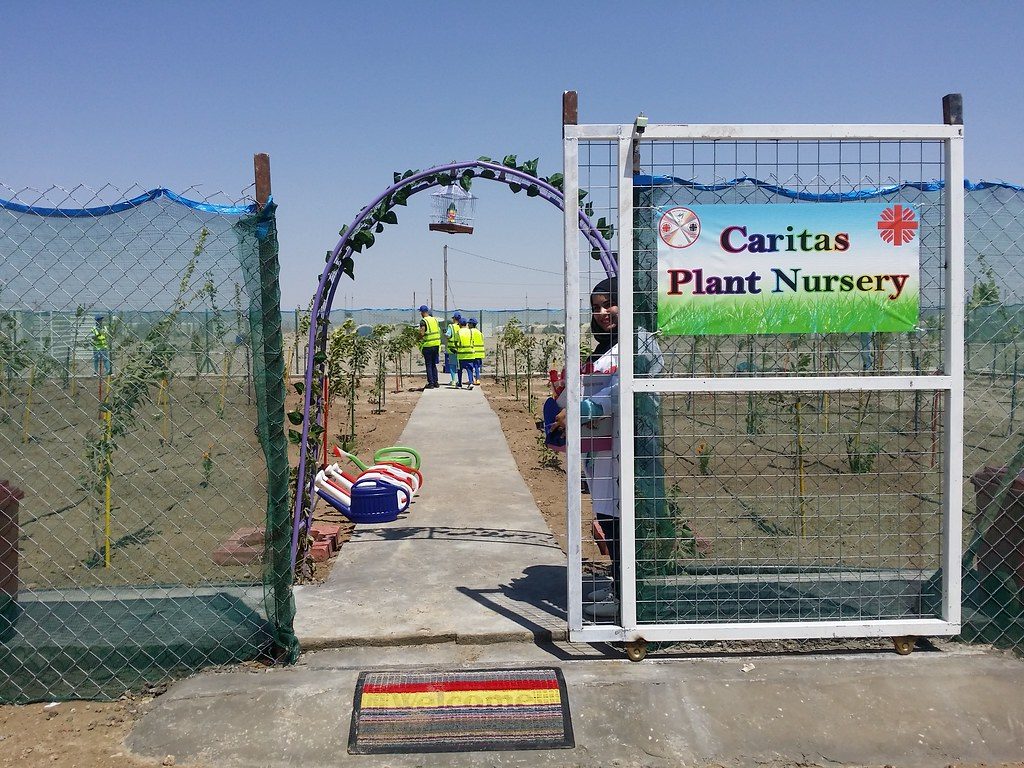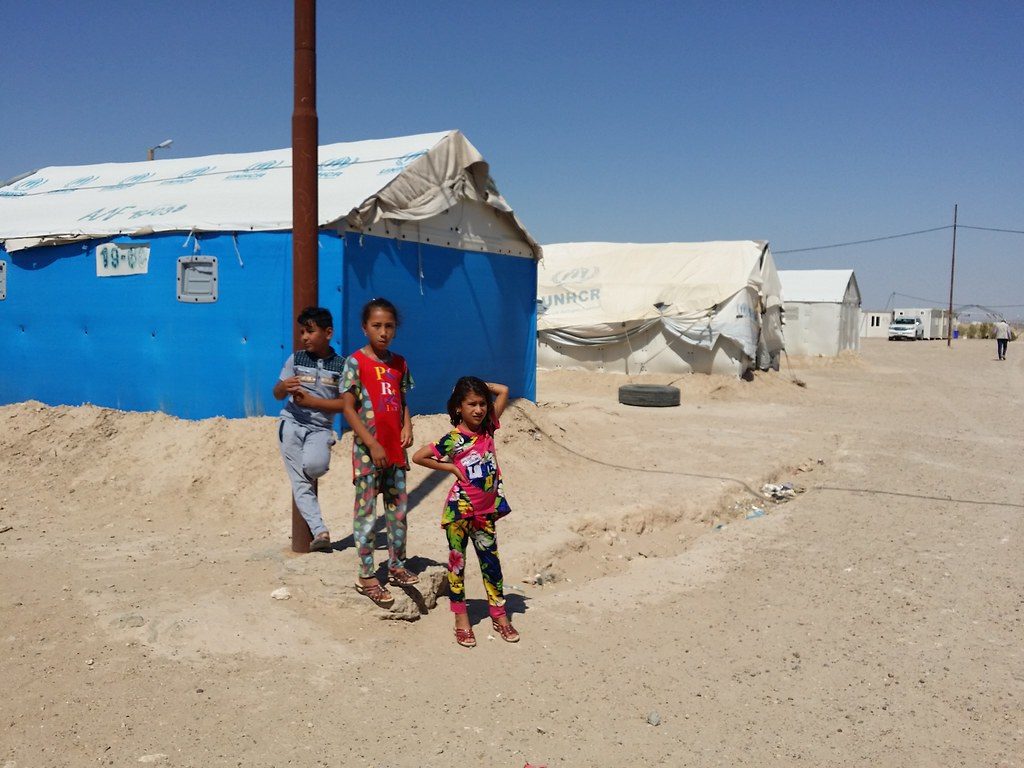Amal shares the story of her life using black and red dots and green lines on a white piece of paper in a psychological support program supported by Caritas Iraq.

Amal lost her home, land, husband and doesn’t sleep at night because she takes care of her 12-year-old son who desperately needs surgery she can’t afford. Amal like so many other women and children are at the Al-Shuhada camp for the internally displaced. It is in Amaryat Al Fallujah, 70 km. west of Baghdad, and it is home to 3200 families. The camp is hardly livable this time of year -with temperatures rising to 43-44 degrees Celsius making it impossible to stay in its tents or shacks.
To cope with some of the effects and symptoms of living with the aftermath of conflict with the Islamic State, Caritas Iraq with the support of Caritas Germany and the German government has set up an education and healthcare centre. Psychological support programs are provided, and groups of young people are learning English with volunteers. Children can play and draw under a gazebo surrounded by flowers and plants.
Psychological support for traumatized women is a key area of work undertaken by Caritas Iraq. Nabil Nissan, director of Caritas Iraq, explains the programme seeks to enable women to resume a more “normal” life. For Amal being close to other women with shared stories is all she has, and she holds on to it.
For youth and children at the camp, going back to school is their dream. Schools were shut down under the Islamic State and only Koranic schools were allowed. They were used for indoctrination. At the camp the children are resuming some of their studies, but long to live in harmony and peace and return to their villages.
In the spirit of peace, Pope Francis is planning to visit Iraq in the Spring of 2020. Cardinal Louis Raphael Sako, Chaldean Patriarch of Babylon in Baghdad hopes the pope and the Iraqi Shiite religious leader sign a document on human fraternity like the one signed recently in Abu Dhabi with the Sunni leader Al Tayyeb.

Cardinal Sako believes holding an inter-religious meeting with a message of building bridges across religions can remind communities of their universality- Jews, Christians and Muslims are all children of Abraham.
The papal visit would include a trip to the Christian community in the Nineveh Plains. Many of the Christians in Iraq were displaced during the occupation by the Islamic State and their numbers have been steadily decreasing since the US invasion in 2003- once numbering close to a million and a half they are now 250,000.
Many moved to Baghdad or left for Canada, the US and Australia. Others are in camps like the Zaiouna camp where for more than two years 75 Christian families from Mosul have been living in container homes. But many families are now returning and rebuilding their lives, says Cardinal Sako, and they need support. At the heart of the matter is creating an environment that ensures religious freedom and the separation of religion and state, particularly as the fundamentalist mindset of ISIS persists.
Since ISIS, Caritas sees its mission as much greater than addressing the material aspects of poverty, it seeks to address the reconstruction of the human person and the rebuilding of solidarity and citizenship after years of an ideology promoting sectarianism.

Caritas’ Volunteers and Peace Building Program is one such initiative that offers vocational courses to young people of all faiths and ethnic groups and encourages dialogue and confidence between different groups. Aida Emanuel from Caritas Iraq says the program’s goal is to plant the seeds of citizenship and of peaceful coexistence, help the poor, promote equal rights, and foster citizens’ participation in civil society.
In early July, a meeting promoted by Caritas Internationalis with Caritas Iraq, its partners from Europe and the US and local institutions discussed the present situation in the country, the state of the Christian community and the relief programs, which provide health assistance to over 12,000 people, education to 6000 children and distribute 100,000 food parcels totaling over 200,000 beneficiaries.
Caritas’ work is well received by local institutions in Iraq and there’s hope that Pope Francis’ visit may contribute to furthering peace and stability. As noted by Nibal Nissan, for Christians seeing the head of the Church cherishing Iraq in his heart gives us the courage and the strength to progress in our mission.
